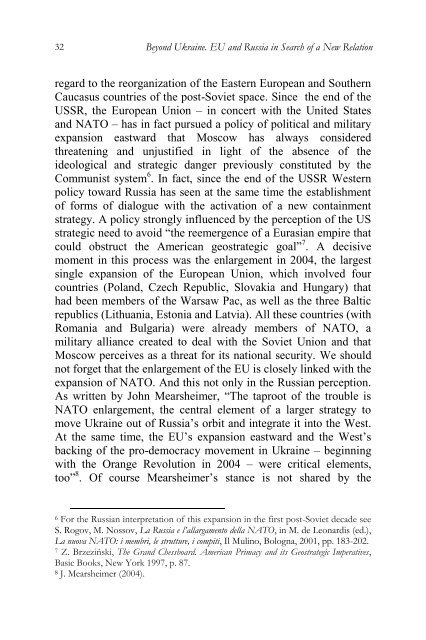beyondukraine.euandrussiainsearchofanewrelation
beyondukraine.euandrussiainsearchofanewrelation
beyondukraine.euandrussiainsearchofanewrelation
Create successful ePaper yourself
Turn your PDF publications into a flip-book with our unique Google optimized e-Paper software.
32 Beyond Ukraine. EU and Russia in Search of a New Relation<br />
regard to the reorganization of the Eastern European and Southern<br />
Caucasus countries of the post-Soviet space. Since the end of the<br />
USSR, the European Union – in concert with the United States<br />
and NATO – has in fact pursued a policy of political and military<br />
expansion eastward that Moscow has always considered<br />
threatening and unjustified in light of the absence of the<br />
ideological and strategic danger previously constituted by the<br />
Communist system 6 . In fact, since the end of the USSR Western<br />
policy toward Russia has seen at the same time the establishment<br />
of forms of dialogue with the activation of a new containment<br />
strategy. A policy strongly influenced by the perception of the US<br />
strategic need to avoid “the reemergence of a Eurasian empire that<br />
could obstruct the American geostrategic goal” 7 . A decisive<br />
moment in this process was the enlargement in 2004, the largest<br />
single expansion of the European Union, which involved four<br />
countries (Poland, Czech Republic, Slovakia and Hungary) that<br />
had been members of the Warsaw Pac, as well as the three Baltic<br />
republics (Lithuania, Estonia and Latvia). All these countries (with<br />
Romania and Bulgaria) were already members of NATO, a<br />
military alliance created to deal with the Soviet Union and that<br />
Moscow perceives as a threat for its national security. We should<br />
not forget that the enlargement of the EU is closely linked with the<br />
expansion of NATO. And this not only in the Russian perception.<br />
As written by John Mearsheimer, “The taproot of the trouble is<br />
NATO enlargement, the central element of a larger strategy to<br />
move Ukraine out of Russia’s orbit and integrate it into the West.<br />
At the same time, the EU’s expansion eastward and the West’s<br />
backing of the pro-democracy movement in Ukraine – beginning<br />
with the Orange Revolution in 2004 – were critical elements,<br />
too” 8 . Of course Mearsheimer’s stance is not shared by the<br />
6 For the Russian interpretation of this expansion in the first post-Soviet decade see<br />
S. Rogov, M. Nossov, La Russia e l’allargamento della NATO, in M. de Leonardis (ed.),<br />
La nuova NATO: i membri, le strutture, i compiti, Il Mulino, Bologna, 2001, pp. 183-202.<br />
7 Z. Brzeziński, The Grand Chessboard. American Primacy and its Geostrategic Imperatives,<br />
Basic Books, New York 1997, p. 87.<br />
8 J. Mearsheimer (2004).


